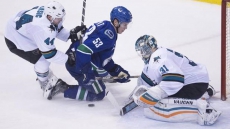TORONTO — A recreational hockey player who broke another player's jaw in retaliation for a high-sticking remains on the hook for damages even though he went bankrupt, Ontario's top court has decided.
That means Matthew Best is now liable for interest and $7,500 in legal costs in addition to the $38,000 in general damages he was ordered to pay Randy Leighton and his wife back in 2009.
The case arose out of a gentlemen's hockey tournament in North Bay, Ont., in February 2004, when Leighton accidentally high-sticked Best, a former junior player, in the face and knocked his tooth out.
Leighton, then 34, circled back to apologize but instead, the two players began yelling and jostling. They dropped gloves. Best, then 23, ripped Leighton's helmet off and punched him once in the face, breaking his jaw in three places.
The six-foot-three Leighton, a soldier trained in hand-to-hand combat, lost three teeth, needed three rounds of dental surgery, had his mouth wired shut and lost 25 pounds.
In awarding him $35,000 in damages and $3,000 to his wife, the trial judge rejected any consent to the injury on Leighton's part, concluding that Best's conduct was "unusual and beyond the scope of the ordinary standards" applicable to the gentlemen's hockey tournament.
However, before forking over the money, Best went bankrupt. He brought a legal motion arguing his bankruptcy released him from his damages obligation.
The motion turned on whether Best had intentionally inflicted bodily harm on Leighton, which, under the Bankruptcy Act, would have ensured the damages award survived the insolvency.
In a decision in September 2013, Superior Court Justice James Wilcox expressed the view that Best should not have to pay "lifelong penance for what was one punch" thrown in the heat of the moment.
"It has not been proven that there was intent to inflict bodily harm," Wilcox said.
In its unanimous decision, the Ontario Court of Appeal this week disagreed with Wilcox.
Among other things, the court noted the original trial judge had concluded Best had thrown the punch intentionally.
"The inference that (Best) intended to cause significant bodily harm is inescapable," the court said.
"The fact that there was only a single punch does not preclude the finding that (he) intended to, and did, cause bodily harm to (Leighton)."
As a result, the Appeal Court said, what Best did put the damages award against him within the exception of the Bankruptcy Act — meaning he still has to pay.






